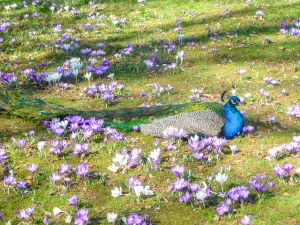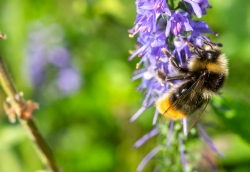2023
Bird flu delays action on peafowl
 The Government advises that the scale of recent avian influenza (‘bird flu’) outbreaks across the UK and Europe has been unprecedented, with cases being confirmed into a second year for the first time. The threat to poultry and other captive birds has meant an Avian Influenza Prevention Zone (AIPZ) has been in force nationally.
The Government advises that the scale of recent avian influenza (‘bird flu’) outbreaks across the UK and Europe has been unprecedented, with cases being confirmed into a second year for the first time. The threat to poultry and other captive birds has meant an Avian Influenza Prevention Zone (AIPZ) has been in force nationally.
The peafowl in Holland Park are not captive, but wild. If they were to be managed in any way, such as introducing new stock, they would no longer be considered wild and would be subject to government restrictions, such as locking up the birds and restricting access to them for all but essential bird keepers. These keepers would be required to change clothing and footwear before entering bird enclosures to limit the risk of the disease spreading.
It is for this reason, that action to strengthen the park’s stock of peafowl has been delayed. The peafowl would have been locked away for much of the past year.
As you will have read in previous newsletters, the first stage is to build a peafowl lock-down cage, well away from where park visitors can reach it. Park visitors must stop feeding the peafowl, for two reasons. Feeding birds in the park encourages them to congregate and thus increases the chance of spreading bird flu from one bird to another. The peafowl need to learn that they are only fed at the site of the cage, so that they think of the cage as ‘home’.
We all want to see these beautiful birds strutting round our park, looking healthy and breeding successfully. Let’s hope that bird flu declines and the council can get on with their programme to create a new pride in Holland Park.
Jennie Kettlewell
[June 2023]
Please help prevent Avian Influenza
There have been 144 confirmed cases of highly pathogenic avian influenza (HPAI) H5N1 in the UK since 1 October 2022, but none have yet been confirmed in Kensington and Chelsea. We want to keep it that way. RBKC Parks Management and the Ecology Service are following government guidelines, but you can help too.
Please don’t feed birds, including peafowl, in the park. Feeding encourages birds to congregate which could spread the disease. Do not touch surfaces where it is evident that lots of birds have been e.g. where there are bird feathers or bird droppings. And please don’t be tempted to pick up peafowl feathers, however attractive they are. If you see a dead bird, do not touch it but please do report it to a member of the idverde staff, or email: Parks@rbkc.gov.uk.
RBKC will launch an impactful poster campaign with a QR code link for updates on the Government website. Or try: https://www.gov.uk/government/news/bird-flu-avian-influenza-latest-situation-in-england#full-publication-update-history
The avian influenza situation means we have had to postpone our plans to re-invigorate our depleted pride of peafowl in Holland Park.
Thank you for helping keep Holland Park’s birds safe.
[February 2023]
Holland Park – a hotspot for wild bees

Holland Park has always had bees. They are important pollinators, along with butterflies, hoverflies and beetles. While you might be familiar with honey bees, they are just one of over 240 species of bee in the UK, and perform less than a third of pollination. The majority of pollination is down to wild bee species, such as bumblebees and solitary nesting leafcutter and mason bees.
If the park’s bees are to thrive, it is essential to provide appropriate habitats to support them with foraging opportunities, as well as shelter and nesting sites. The main causes of bee decline are man-made stressors, including habitat loss, degradation and fragmentation.
For many years, Holland Park has hosted managed honey bees in hives. Keeping bees in hives offers no benefit to the ecology of the park, though the local community does like to buy the honey, when there is some.
The RBKC Ecology Service is working to help bees and other pollinators by developing a Bee Superhighway that aims to increase the number of linked pollinator hotspots right across the borough. Holland Park is intended to be one of those hotspots. The approach will be to support a healthy wild bee population, instead of managing honey bees in hives, which compete with wild bees for limited resources.
We can now look forward to bee banks, nesting sites and flowers that bees can’t resist, all of which will serve as a valuable way of engaging children in wildlife.
Jennie Kettlewell
[February 2023]
